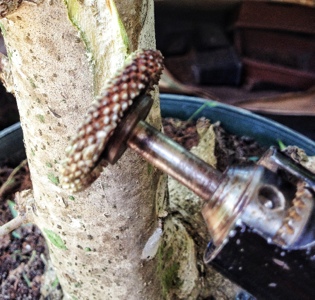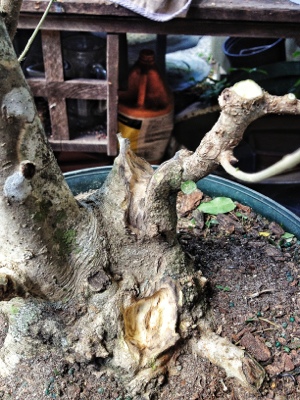
This little tree is known as the Florida privet. It’s not a true privet though (ligustrum species) but is called the forestiera segregata. Same family as a ligustrum, the olive (Oleaceae) family. It is native to the coasts of Florida and up into Georgia and South Carolina. It also appears in the Bahamas and other islands such as Puerto Rico or the Antilles.
This one was collected by Erik Wigert in SW Florida (one of the best yamadori collectors here in Florida) and I got it in a raffle at the 2012 BSF convention. Some Florida bonsai people really don’t like the tree much because, if you don’t stay on the pruning, the internodes will be too long and the tree will get leggy. Of course, Florida bonsai people don’t like the torolusa (Hollywood) juniper for the same reason too. I say “Prune your trees more,dude!”

Here’s an example of a mature florida privet bonsai from Erik. A great example of what can be done with one. Looks good to me, how ’bout you?

My first step is partial defoliation. Since its summer and I want more growth to thicken the branches I am going to leave 2 leaves on each branch (more or less). The branches on the bottom have been de-leafed .

Ah, naked!

I really like the angular character of this branch

And this one as well, the “almost”second trunk. These two features set the tone of the whole branch structure.

Good top branches.This tree is heavily apically dominant. If you don’t keep the top cut back it will weaken the bottom branches. 
On to the carving then.
First I will open up a “V” shape to facilitate ease of insertion of my tool into the subject.


Like so.

My rotosaw carving bit.

Make sure your lines are random and flowing. The eye abhors symmetry and straight lines. 
Here’s the back,of the top,of the (soon to be) hollowed,apex.

That’s most of the material carved out. About the privet: It is very dense wood and it is persistent and not easily rotted like some semi tropical, broadleaf evergreens. It takes detail well after it has dried and aged a bit. The new wood is pithy and stringy,though,after carving. You can use a torch or sand paper to remove the fibers. 
Here’s a detail of the front. I like to keep details hidden so as to make the viewer look into the tree more. Mystery is a favorite compositional tool I use. A half dressed woman is more alluring than a fully nude wide spread centerfold. Mostly.

I cleaned up the other places where deadwood was evident (from some bad pruning practices)and made them a bit more natural looking (hopefully). I tried to make the hollows with a round lines, following the growth rings, instead of a linear technique.

Which you can see better here.

I tried to catch the detail in a picture and I couldn’t quite get it. It is there, though. Look closely, squint a bit, close your right eye and stick your tongue out. Can you see it? I’ll get a better pic when it dries and I coat it with lime sulfur. 
Carving done,so it’s pot time. It’s also time to put it in its new container.

Saw,saw,saw…
Rake,rake,rake…..

Side

Side

Rear (cute rear,huh?)

Over the shoulder

And the front.
I should get good growth and even some ramification this year.

Here’s another large one from Erik (check out his site www.wigertsbonsai.com)

Medium or chuhin size,Erik’s as well

Here’s a shohin (small) size I got from Paul Pikel (YouTube star of OrlandoBonsaiTV http://YouTube.com/orlandobonsaitv). I haven’t repotted it this year so I haven’t seen much growth yet. They respond really well to root pruning and tend to explode with growth when you repot. I’ll post pics of them in a few weeks.

This one I carved,styled and repotted about a month ago.I’ve also cut it back once. But it’s time for some trim.
I also have to prune the tree.

There it is. You can see the speed of growth and how quickly they can develop. I think it can be a satisfying addition to your collection. It is cold hardy too. At least into South Carolina. I certainly don’t protect them here in Orlando. And I’ve had it at 19 degrees Fahrenheit overnight.
They are heavy drinkers and like lots of fertilizer, especially micro nutrients like iron. I haven’t seen many pests yet.
Updates to follow…..